Reply To:
Name - Reply Comment
Last Updated : 2024-04-19 09:49:00
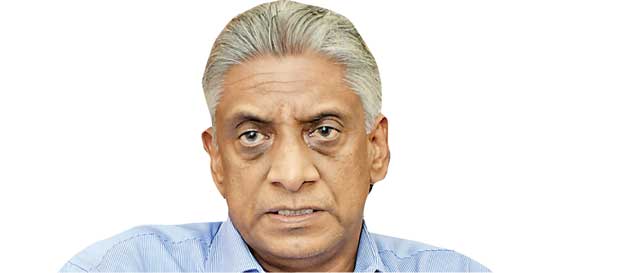
 In Sri Lanka, the Prevention of Terrorism Act (PTA) and the Emergency Regulations introduced to combat LTTE terrorism and other Tamil militant groups are considered by Human Rights activists to be draconian pieces of legislation. They charge that those detained under the PTA are unjustifiably remanded for decades with no charges against them or charges which are based on confessions made to police officers under duress. Human Rights activists claim that apart from the injustice faced at the hands of the police and the prison officials, they also undergo harassment from fellow prisoners. These prisoners detained under the PTA are constantly referred to by the Tamil politicians and Human Rights activists as “Political Prisoners.”
In Sri Lanka, the Prevention of Terrorism Act (PTA) and the Emergency Regulations introduced to combat LTTE terrorism and other Tamil militant groups are considered by Human Rights activists to be draconian pieces of legislation. They charge that those detained under the PTA are unjustifiably remanded for decades with no charges against them or charges which are based on confessions made to police officers under duress. Human Rights activists claim that apart from the injustice faced at the hands of the police and the prison officials, they also undergo harassment from fellow prisoners. These prisoners detained under the PTA are constantly referred to by the Tamil politicians and Human Rights activists as “Political Prisoners.”
Sri Lanka has had a history of certain abuses targeting prisoners under PTA. As a result of unrest created between those held under PTA and other non-Tamil prisoners in the past, those detained under the PTA and the Emergency Regulations are now exclusively housed at the New Magazine prison. However they are sent to the Welikada Prison Hospital for medical treatment.
Velayutham Varatharajan, remanded at the New Magazine Prison, was implicated in an attempt to assassinate former President Chandrika Kumarathunga. He was convicted by the High Court of Colombo under the PTA for aiding and abetting the attempt. His appeal is currently pending at the Court of Appeal. On April 22, he had fallen sick and was admitted to the Welikada prison hospital. Initially he was admitted to the open ward. Thereafter he had been moved to the cell section in the hospital which is similar to a prison cell. K.S. Ratnavale, human rights activist and senior lawyer who is appearing on behalf of Varatharajan said that most PTA detainees were directed to this cell section. “This is not because of prison overcrowding but simply because they are political detainees and are of a particular ethnicity,” he said.
Varatharajan, who is under medication for hypertension, had refused to go to the cell section. He had been writhing in pain and doctors expressed suspicion that he may have contracted dengue. Despite his condition, the Officer-in-charge had moved him to the cell section and he had to sleep on the floor. “The doctor who checked him the next day recommended that he should be admitted to the National hospital. But he was not taken and the officers assaulted and verbally abused him saying that he was from the Magazine prison and therefore should not be taken. Even the doctor’s recommendation is not taken seriously,” said Ratnavale.
According to Ratnavale, the treatment at the Welikada prison hospital is very basic. “They only have a few painkillers and other basic medicines. Drugs prescribed to patients are not available. Though there is a procedure to bring drugs from outside, it is cumbersome and time-consuming. There are no X ray facilities. They are willfully keeping the standards low. The prison hospital only serves politicians convicted by courts or remanded. People like Duminda Silva who have been sentenced to death are in the Open ward, though they are not sick. But the truly sick are neglected,” added Ratnavale.
Unable to bear the discriminatory attitude of the prison authorities and the horrific conditions under which he was placed, Varatharajan had pleaded with the doctor to be released from the hospital. However, the doctor had refused as his condition was serious. Varatharajan persistently said he would take responsibility. Consequently he was sent back.
Ratnavale said that when doctors recommend prisoners to be taken to the National Hospital for treatment under the PTA, they have to be escorted. However this escort is not available at all times. When there is no escort, despite the patient’s helpless cries and the doctor’s recommendation, the patient is not taken. “They are taken to the hospital only when the Court orders it. It takes a few days to get a Court Order,” said Ratnavale.
“Step-motherly treatment is given to prisoners, so much so that prisoners don’t want to go to the prison hospital. It is ill-equipped and officers are racist. Minor staff members are convicted criminals who are themselves racist. They often assault these prisoners,” said Ratnvale. According to recent reports, at least 15 prisoners work as nurses at the Welikada prison hospital. Though there are six main wards in the Prison with nearly 300 patients, there are only three nursing officers. According to Health Ministry sources, the provision of nursing staff falls under the purview of the Prison Department.
“Another prisoner’s blood sugar level went very high and his left side was almost paralyzed. When he was admitted to the prison hospital, they refused to give him treatment. He was kept there for a long time and wasn’t given any food. Though the doctor had recommended urgent treatment, the Commissioner General said that was not the case,” Ratnavale added, pointing out how the doctors’ recommendation was overridden by top prison officials. As a result of the ‘step motherly’ treatment at the Welikada Prison hospital, ‘political prisoners’ now plead for an established medical centre at the magazine prison. Attorney-at-Law Suren D. Perera said that in 2013, when a victim was severely tortured at the Bogambara Remand prison, he had been denied admission to the General Hospital, as the General Hospital doctors inquired about injuries and refered them to the JMO and the police if they suspected there had been a human rights violation.
Political prisoners or not?
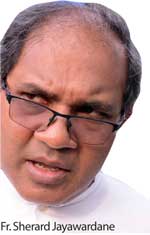
The government has repeatedly stated that there were no political prisoners in the country. When asked about this claim, Fr. Sherard Jayawardane said the statement was unacceptable. “In 1971 and 1989, JVP Sinhalese youth fought for a political cause. Similarly, the LTTE also fought for a political cause. They wanted freedom and therefore it was a political cause,” he said, adding that the government’s claim was merely a cover up. Speaking to Daily Mirror at a protest held recently by the National Movement for Release of Political Prisoners, he stressed that the government should release all political prisoners. He added that the disadvantaged Tamil minority had not still been offered a political solution for their predicaments which are manifold.
Are all PTA detainees LTTE sympathizers?
Not all detainees are hardcore LTTE supporters. Daily Mirror learns reliably that while leaders of the LTTE have escaped imprisonment, a majority detained under the PTA are merely implicated, had no part in the master plans and have been in remand for years. According to Perera, ‘political prisoners’ in the Kandy remand prison are not hardcore LTTE cadres. “They are upcountry Tamils who have lived in estates for a very long time. The LTTE have bribed them with money or beer, to entice them to provide their three-wheelers and other assistance as needed,” he said. “The hardcore LTTE leaders have not been arrested. Through my clients, I have learned that the LTTE leader in Kandy was not arrested. He has gone to Malaysia,” added Perera.
The Prevention of Terrorism Act
The repeal of the Prevention of Terrorism Act No.48 of 1979 (PTA), has been repeatedly demanded by Human Rights activists. The PTA introduced in 1979 was intended to be a temporary measure. However in 1982, the PTA was made a permanent law in the country. Under the Evidence Ordinance, confessions made to police officers are not admissible before courts. This Ordinance was introduced by the British who were well aware of the notoriety of police officers for torturing inmates and obtaining confessions. However according to the PTA, confessions made to police officers above the rank of Assistant Superintendent of Police (ASP) are admissible. Yet activists point out that the practice of torture is prevalent even among top officials.
Ratnavale said that nearly 99% of cases filed under the PTA were based solely on the confessions of the accused which were more often than not, extracted by inflicting fear and under duress. Usually the prosecution proves the case against the accused. However, the PTA mandates that the burden of proof lies on the accused. “In most cases, the main evidence is the confession. In the Voir Dire inquiry, we must prove that the confession was extracted under duress. So the burden of proof lies with the accused,” explained Perera. He pointed out that in practice, it was extremely difficult to prove that a confession was extracted under duress as there would be no witnesses to speak on behalf of the accused. “So in most cases the accused pleads guilty,” he pointed out.
Bail cannot be granted under the PTA and therefore many who have been implicated in LTTE-related violence have been in remand for decades. The PTA permits arbitrary arrests without warrants.
“They can be housed in unofficial places such as STF and army camps,” said Perera. Activists point out that the worst forms of human rights abuses take place in these unofficial detention centres. Perera also noted a hesitance on the part of judges and state counsels to initiate trials as they were time-consuming. As a result, trials are postponed. Perera further pointed out that plea bargaining was no longer in use, which has also restricted the options available to political prisoners. In plea bargaining, the defence counsel bargains with the state counsel and the judge on a punishment before the case is called. Then at the trial the accused pleads guilty and the decided punishment is given, which is most often a reduced sentence. “They amend the indictment for lesser charges for which there are no minimum charges. Then the judge can give a lesser sentence. Before February this year, the Attorney Generals Department had a policy to amend the charges under the PTA, where there was no damage to property or life. But they no longer amend charges,” he said. The Counter Terrorism Bill which is to replace the PTA has been approved by the Cabinet. However, activists have pointed out that it is more draconian that the PTA.
Other concerns
Cases based solely on a confession rejected by court should be withdrawn. However, this has not been the case with regards to charges against those detained under the PTA. “There is a trial going on in the High Court of Colombo based on the confession rejected in the Vavuniya High Court. Although the lawyers made submissions that the confession has to be rejected, the Attorney General did not consent to it,” said Ratnavale.
He added, “In another trial, the confession made by a former police officer who has been in remand for the past eight years was rejected. But there are four other cases against him based on the same confession.” When cases with confessions rejected by a court are proceeded with by another court, it affects the consistency of judicial decisions.
Legal framework
Sri Lanka has ratified the International Covenant on Civil and Political Rights (ICCPR), the Convention against Torture and Other Cruel, Inhuman or Degrading Treatment or Punishment and the International Convention on the Elimination of All Forms of Racial Discrimination. Sri Lanka is a signatory to the Geneva Convention. Further, local statutes such as the Constitution and the Torture Act are supposed to protect people from arbitrary arrest and torture. The PTA however, contravenes provisions in them.
When a victim was severely tortured at the Bogambara Remand prison, he had been denied admission to the General Hospital
Attorney-at-Law Suren D. Perera
1983- During the Black July riots, 50 Tamil prisoners were gruesomely killed at the Welikada prison. Prison authorities had allegedly encouraged convicts to attack the political detainees. Compensation was paid to the families of the victims consequent to cases filed in the District Court of Colombo by the Civil Rights Movement, spearheaded by the late Desmond Fernando P.C. who was twice President of the Bar Association of Sri Lanka (BASL) and Ms. Surya Wickremasinghe.
2000- Two prisoners at the Kalutara prison were killed as a result of being attacked by fellow prisoners and guards. PTA detainees had organized a memorial event to commemorate leading politician and lawyer Kumar Ponnambalam on January 7, 2000. Prison authorities, angered by this gesture, opened the compound of the convicts who pounced on the political prisoners. Though the perpetrators were identified at the inquest, the Attorney Generals Department did not prosecute or pursue the matter. However the family of Sivaratnam Sri Kumar who was killed, filed a civil case for damages before the District Court of Kalutara. They received compensation of a reasonable sum. The Attorney General’s Department appealed against the award of compensation but the order of the Kalutara District Court was affirmed by the Appellate Court.
2012- When prisoners protested against certain measures taken by the prison authorities at the Vavuniya prison, the Special Task Force was brought in on the orders of the leaders of the previous government. The STF allegedly assaulted the prisoners who sustained grave injuries. The twenty prisoners were taken to the Anuradhapura prison in the middle of the night where they were allegedly further assaulted. That same night they were then taken to the Mahara prison, where officers finally decided to direct them to the hospital. However two prisoners succumbed to their injuries.
D.M. Swaminathan- Minister of Prison Reforms, Rehabilitation and Resettlement and Hindu Religious Affairs
Speaking to Dailymirror, D.M. Swaminathan, the Minister of Prison Reforms, Rehabilitation and Resettlement, dismissed allegations that PTA detainees were discriminated within prisons. “If there is any discrimination and if I am informed, I will handle it. I will take steps immediately,” he said.
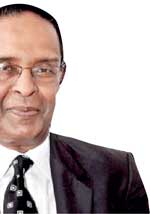
According to him there are 72 detainees under remand custody whose cases are pending at various High Courts and whose trials are at different stages. Out of them, 57 are Tamils, 9 are Sinhalese and 6 are Muslims, he said. “The total number of cases pending at the Attorney General Department is 16. The total number of suspects is 29. Sixteen are Tamil, 8 are Sinhalese and five are Muslim. Out of the sixteen files, four indictments are being prepared and three have been recommended to be discharged. So these seven files will be over within another month’s time,” he added. When asked about reports claiming prisoners were performing the duties of nurses, he said that if they were employed, they would be paid. “According to my knowledge, if prisoners are employed it is good as they get paid. They work in the prison hospital and not outside, so what is the harm? There is nothing wrong about that,” he said.
The total number of cases pending at the Attorney General Department is 16. The total number of suspects is 29. Sixteen are Tamil, 8 are Sinhalese and five are Muslim.
Mano Ganesan- Minister of National Co-existence Dialogue and Official Languages
Mano Ganesan, Minister of National Co-existence Dialogue and Official Languages said when the current government came to power there were around 200 detained under the PTA and this number has reduced to nearly 100. “This is a favourable and progressive step. Yet, we have to address the issues of the rest in detention under the PTA,” he added.
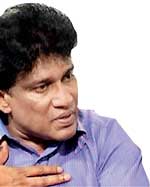
Stressing that the PTA had to be repealed, he said the government had pledged to the nation and international community to do so. “This is going to be replaced by the Counter Terrorism Act. Its draft has been debated nationally and internationally. There are many negative opinions expressed to the extent that people claim it is more draconian than the PTA. This is a point to ponder over. But we can’t simply reject it. Though is has been drafted and has gone through the cabinet, it has to be amended before it comes to the parliament,” he said.
Referring to those still detained, he suggested that they should be granted general amnesty, rehabilitated or bailed out. “Certain prisoners have been sentenced. But they have already spent 15 to 25 years in remand. They should be given general amnesty similar to how amnesty was granted to the southern insurgents in the 70s and 80s,” Ganesan said. “Others whose trials are ongoing should be bailed out or should be sent to rehabilitation centres. After the rehabilitation period of six months or one year, they should be sent home. When it comes to those who were not sentenced or charged but detained for investigation, they should be released immediately on bail,” he added.
This is going to be replaced by the Counter Terrorism Act. Its draft has been debated nationally and internationally. There are many negative opinions expressed to the extent that people claim it is more draconian than the PTA. This is a point to ponder over. But we can’t simply reject it. Though is has been drafted and has gone through the cabinet, it has to be amended before it comes to the parliament
Wijeyadasa Rajapakshe- Minister of Justice and Buddha Sasana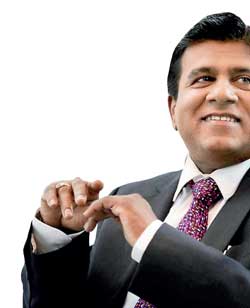
When asked about the government’s stance with regards to the campaign to release political prisoners, Wijeyadasa Rajapakshe, Minister of Justice firmly maintained that there was not a single Tamil political prisoner in Sri Lanka. “There are only criminals. After Sarath Fonseka’s case there have not been any political prisoners in Sri Lanka,” he said.
“The Counter Terrorism Act is only a proposal. The law is the PTA. We have not applied it during the recent past,” he added.
There are only criminals. After Sarath Fonseka’s case there have not been any political prisoners in Sri Lanka
Thushara Upuldeniya- Prison Media Spokesperson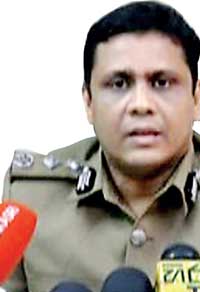
Refuting the allegations made by activists Thushara Upuldeniya, the Prison Media Spokesperson reiterating the Minister of Justice, said there were no political prisoners in Sri Lanka. “Detainees are those whose trials are ongoing before courts or who have been charged,” he said. When asked about the discrimination faced by those detained under the PTA, he said nothing of the sort had been reported to him. Responding to the allegation that prisoners perform the duties of nurses he said this was untrue. “There is a shortage of nurses and prison officials. We have received permission to recruit people. As a temporary measure, we have decided to recruit retired nurses,” he said. He added that there were no life-threatening shortcomings at the prison hospital and that facilities such as X-rays were available.
However, when asked about the structure of the Welikada prison hospital, the media spokesperson refused to disclose information for security reasons.
Detainees are those whose trials are ongoing before courts or who have been charged

Add comment
Comments will be edited (grammar, spelling and slang) and authorized at the discretion of Daily Mirror online. The website also has the right not to publish selected comments.
Reply To:
Name - Reply Comment
On March 26, a couple arriving from Thailand was arrested with 88 live animal
According to villagers from Naula-Moragolla out of 105 families 80 can afford
Is the situation in Sri Lanka so grim that locals harbour hope that they coul
A recent post on social media revealed that three purple-faced langurs near t